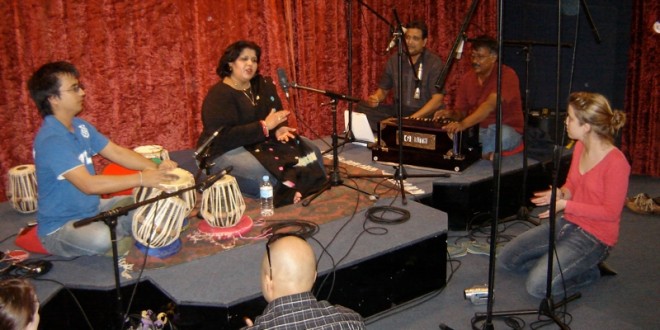The previous post, Eye Contact, discusses a communication that is instantaneous and entirely non-verbal. Eye contact is very difficult for me to maintain - I find it too intense and distracting from aural / verbal language. In a physical theatre situation, the different "vocabularies" of the dancer and musician (physical vs aural) can often be overcome through speech and verbal communications. At least we have similar verbal language. It has been a feature of my career that I choose to work with people for different cultures with different verbal language backgrounds Perhaps it is a reflection of the diversity of the Baha'i community in which I move. One of the projects that was under way during the research period was a documentary "Donkey in Lahore" with director Faramarz K-Rahbar.
The story concerns a Brisbane man who travels to Pakistan, falls in love and spends four years in the limbo of half married but apart from his beloved. The music reflected the clash of traditional Pakistan and our hero's Goth background. I wrote a number of pieces in Qawalli and Lollywood1 styles for the film and we employed musicians from the region to perform and record them. These were very interesting sessions as there was significant cultural elements to communication, with participants from India, Nepal, Pakistan, Iran and Australia, with much of the discussion among the musicians occurring in Urdu broken English and much musical demonstration, singing and gesticulation.
I noted that my own communication style was very relaxed. I worked hard to ensure that we understood each other, and so did they. I even received an email from one participant expressing enjoyment of the sessions and commenting "I believe in the communication between you and I". I was rather surprised by this as the effort of communicating, although enjoyable, was rather draining. On looking at the tapes however, I noted that the musicians were clearly adapting their own communication style to deal with me, the Western outsider to their process. When there is no expectation of immediate understanding, all sides work harder to be understood and to understand. In much of our social interactions, common understanding is taken for granted, and it takes a visible difference to trigger that effort.
I also noted that within this context I was more open to change, ideas and adaptation than I am in general life. I am sure that the cultural mix was a part of this - I was deferring to traditions and musical skills in some cases, however the reflection on these sessions led me into investigating whether the studio / collaborative music environment itself has an influence on my ability to empathise and communicate.
Unfortunately I did not get consent to use video of these session in the dissertation, but for me the sessions were a turning point in the investigation.
- Lahore has its own film industry that rivals Bollywood [↩]
Related Posts
- Video Procedures: A description of the way that video was used to enhance Systematic Self Observation
- Musical Compromises: Collaboration is a constant process of compromise - something I find frustrating and occasionally depressing.
- Rationale: The Rationale deals with the specific questions and sub-questions addressed by the research, as well as outlining the expected benefits to interested parties.
- Meaning Making: Meaning must surely be found somewhere?
- Interviews: Interviews provided great insight into the collaborative process.
- Current practice: I am now teaching music and sound production full time at Tertiary level and continue to work compose for collaborative projects.
- Informed Consent: Discussion on the process of defining and obtaining Informed Consent from participants.
